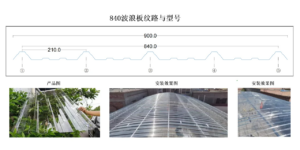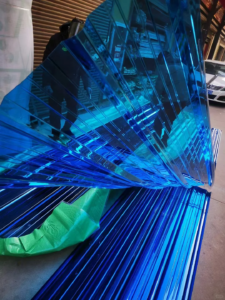The Versatile and Advantageous Polycarbonate Wave Tile

In the world of construction and roofing materials, polycarbonate wave tile has emerged as a popular and highly practical option. This blog post will explore the various applications, unique characteristics, and numerous advantages of polycarbonate wave tiles.

Applications of Polycarbonate Wave Tiles
Construction Projects
Polycarbonate wave tiles are widely used in both residential and commercial construction. In residential buildings, they can be seen on rooftops, creating an aesthetically pleasing and functional roofing solution. Their wave shape not only adds a touch of style but also enhances water runoff, preventing waterlogging. For commercial structures such as factories, warehouses, and shopping malls, polycarbonate wave tiles are favored for their ability to provide large – scale, durable roofing that can withstand different weather conditions.
Agricultural Use
In the agricultural sector, polycarbonate wave tiles play a crucial role. They are commonly used in the construction of greenhouses. The excellent light – transmitting properties of polycarbonate allow sufficient sunlight to penetrate, which is essential for plant growth. At the same time, the wave tile design helps in proper ventilation and drainage within the greenhouse, creating an ideal environment for cultivating various crops.
Outdoor Shelters
Outdoor shelters like pergolas, carports, and walkway covers often utilize polycarbonate wave tiles. These tiles offer protection from the sun and rain while still allowing a certain amount of natural light to filter through. This makes them perfect for areas where people want to enjoy the outdoors while being shielded from the elements.
Characteristics of Polycarbonate Wave Tiles
High Durability
Polycarbonate is a strong and robust material. Polycarbonate wave tiles are resistant to impact, meaning they can withstand hail, strong winds, and even minor collisions without cracking or breaking easily. This durability ensures a long lifespan, reducing the need for frequent replacements.
Transparency and Light Transmission
One of the most notable characteristics of polycarbonate wave tiles is their transparency. They can transmit a significant amount of light, which is beneficial in applications where natural light is desired, such as in greenhouses and indoor – outdoor transition areas. The light transmission can be adjusted depending on the type of polycarbonate used, with some variants offering up to 90% light transmittance.
Weather Resistance
Polycarbonate wave tiles are highly resistant to various weather conditions. They can endure extreme temperatures, from the cold winters to the hot summers, without warping or deforming. Additionally, they are resistant to UV rays, which prevents discoloration and degradation over time. This weather resistance makes them suitable for use in different climates around the world.
Lightweight
Compared to traditional roofing materials like tiles or metal sheets, polycarbonate wave tiles are relatively lightweight. This makes them easier to handle and install, reducing labor costs and the strain on the building structure. Despite their lightweight nature, they still maintain their strength and durability.
Advantages of Polycarbonate Wave Tiles
Cost – Effectiveness
In the long run, polycarbonate wave tiles are cost – effective. Their durability means fewer replacements, which saves money over time. Additionally, their lightweight nature reduces installation costs. In applications like greenhouses, the improved plant growth due to better light transmission can lead to increased crop yields, further justifying the investment.
Energy Efficiency
The ability of polycarbonate wave tiles to transmit natural light helps in reducing the need for artificial lighting during the day. This can significantly cut down on energy consumption in buildings. In addition, some polycarbonate wave tiles can also provide a certain degree of insulation, helping to regulate indoor temperatures and reduce heating and cooling costs.
Easy Installation
Thanks to their lightweight design and simple interlocking or fastening systems, polycarbonate wave tiles are easy to install. This allows for quicker project completion times, minimizing disruptions. Even for DIY enthusiasts, installing polycarbonate wave tiles can be a manageable task with the right tools and instructions.
Design Flexibility
Polycarbonate wave tiles come in a variety of colors, thicknesses, and wave patterns. This provides designers and homeowners with a high degree of design flexibility. Whether you want a sleek, modern look or a more traditional aesthetic, there is a polycarbonate wave tile option to suit your needs.

In conclusion, polycarbonate wave tiles offer a wide range of applications, possess unique characteristics, and come with numerous advantages. Whether you are planning a construction project, building a greenhouse, or creating an outdoor shelter, polycarbonate wave tiles are definitely worth considering.
